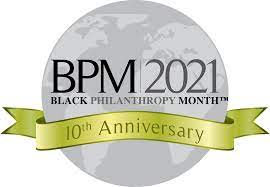
Saluting Black Women Givers
Posted by Dr. Beth Reaves
What does it mean to give?
August is Black Philanthropy Month, an opportunity to recognize and celebrate those in the Black community who give of themselves to support community growth. Recognizing that Black philanthropists were often not included in the perspective on philanthropy, Black Philanthropy Month was established nearly a decade ago by Dr. Jacqueline Bouvier Copeland and the Pan-African Women’s Philanthropy Network (PAWPNet), to elevate visibility of on-going philanthropy in the Black community. A recent article by Ophelia Akanjo, Black Women In Philanthropy: the Art of Everyday Giving as Activism, published in the Nonprofit Quarterly furthers the discussion on philanthropy and giving in the Black community, particularly focusing on Black women’s long history as philanthropists. Akanjo states “Black women philanthropists are essential to the growth of the philanthropic space and yet are often sidelined. Seemingly, some of the core guiding principles for their philanthropic activism include community building and advancement, leveraging access and equity, religion and faith, and sparking change within their communities and beyond.” She notes that Black women have always been involved in supporting families, organizations and communities, but haven’t necessarily labeled themselves philanthropists, or been included in the overall vision of philanthropy.
One definition of a philanthropist is someone who “seeks to promote the welfare of others.” Yet when you search on philanthropists, the immediate results are focused on those giving the most money. Missing are the many community developers, family supporters, champions for churches and faith based organizations and others who do indeed “promote the welfare of others.”
We need a fresh inclusive view of philanthropy.
As a Black female leader of an organization wholly focused on educational equity for girls of color in Washington DC, I have seen firsthand the generous commitment and support given to our school by Black women. In fact one of the shoulders our school’s foundation rests on is Mary McLeod Bethune, a great humanitarian and philanthropist. It is through being guided by this founding spirit that the Washington School for Girls has been able to thrive in serving Black and Brown girls for nearly 25 years. Our school is 100% scholarship for our students, and as such, relies on important philanthropic support to sustain our program each year. And each year Black women with their many gifts support our school program. There is an innate desire to give of themselves often because they see themselves in the very faces and families of the students they are called to support. They remember what it’s like to be a young girl. They want to be the voice that they perhaps didn’t have at that age. They feel a desire to share their success with others. They want to use their life experiences to inspire. They feel inspired by our young girls. They want them to know that as girls of color, they are so much more than what others may say – and so very deserving of all that life has to offer.
Yet what I’ve come to notice is consistent with what Akanjo states in her article: some of the Black women who generously support our school tend not to categorize themselves as philanthropists. She further reflects on Black women “givers” throughout history stepping forward to support their communities, meeting the needs of others in their everyday lives. I think many of the Black women givers at WSG share that perspective. Even as they joined our school community volunteering with students, providing needed supplies to the school program, and yes, giving monetary donations for support they have humbly shied away from words like philanthropist and donor. They have found connections to our school personally that leads them to be here with our students. Akanjo notes that the elevated title “philanthropist” often leaves Black donors and more specifically Black women feeling like they are too small for the title because its perceived historical meaning is staked in the size of a gift. However, a philanthropist in its most plain definition is a person who seeks to promote the welfare of others.
An inclusive view of philanthropy would now consistently include the many ways that people connect with and share their time, treasure and talent to support organizational and community growth. Black women, as givers–as philanthropists, are an important segment of philanthropy. Recognizing them, calling them to the proverbial giving table allows more Black women to see their own giving as philanthropic. They need to see themselves through others that are a reflection of themselves. We can do this by honoring more Black women givers at galas for their contributions, expanding our definitions of major gifts to include more than just a top dollar amount–meaningful gifts can have a lasting impact on an organization and an individual, and by actively asking Black women to give to organizations.
